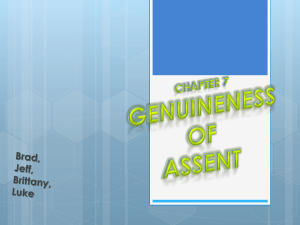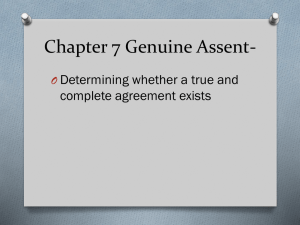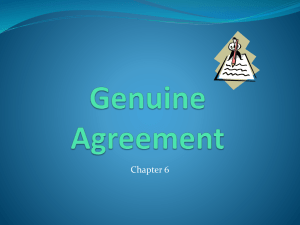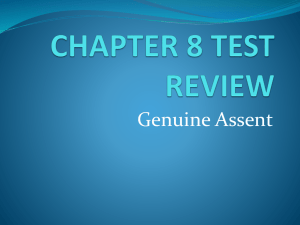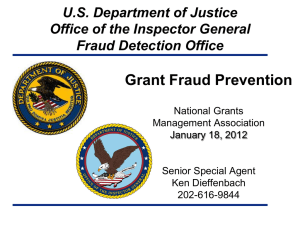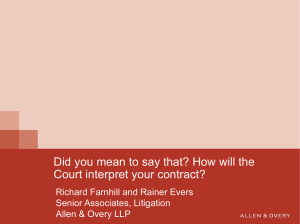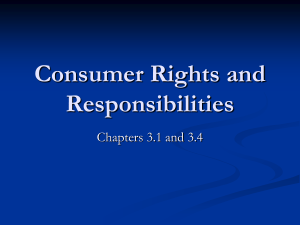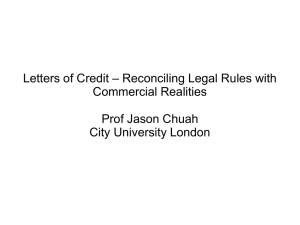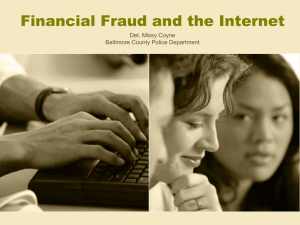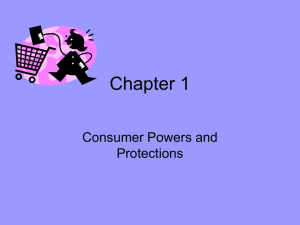Genuine Agreement Ch 6 PPT
advertisement
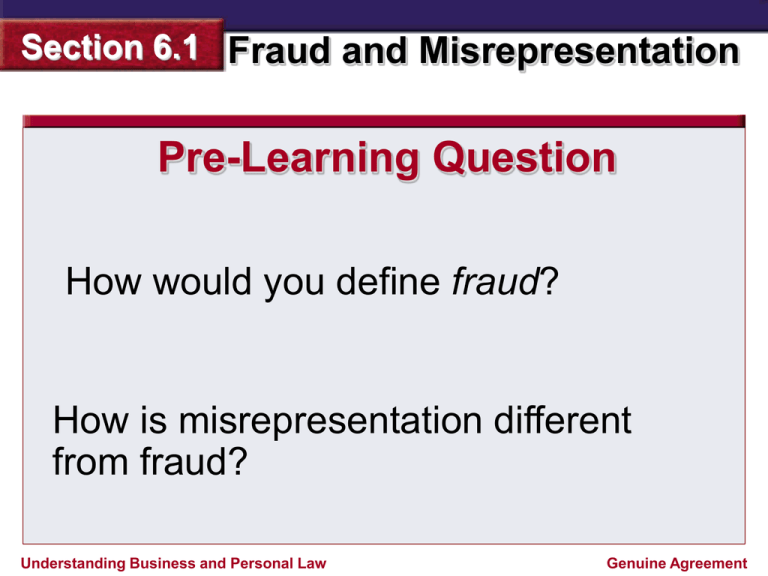
Section 6.1 Fraud and Misrepresentation Pre-Learning Question How would you define fraud? How is misrepresentation different from fraud? Understanding Business and Personal Law Genuine Agreement Section 6.1 and Misrepresentation Agreement Chapter 6FraudGenuine Section 6.1 Fraud and Misrepresentation Section 6.2 Mistake, Duress, and Undue Influence Why It’s Important Learning the elements of fraud may prevent you from being victimized or help you claim your rights if you are defrauded. Understanding Business and Personal Law Genuine Agreement Section 6.1 Fraud and Misrepresentation What You’ll Learn How to identify the elements of fraud (p. 128) How to distinguish between fraud & concealment (p. 129) How to distinguish between fraud and innocent misrepresentation (pp. 128 and 132) How to distinguish between the remedy available for fraud and the remedy available for misrepresentation (pp. 128 and 132) Understanding Business and Personal Law Genuine Agreement Section 6.1 Fraud and Misrepresentation Section Outline Defective Agreements Fraud False Representation of Fact Representation Known to Be False False Representation Intended to Be Relied Upon False Representation Actually Relied Upon Resulting Loss Innocent Misrepresentation Understanding Business and Personal Law Genuine Agreement Section 6.1 Fraud and Misrepresentation Genuine Agreement If the offeror makes a valid offer, and the offeree has made a valid acceptance, then a genuine agreement has been reached. The courts describe this type of agreement as “a meeting of the minds.” Understanding Business and Personal Law Genuine Agreement 6.1 Section 6.1 Fraud and Misrepresentation Genuine Agreement Several circumstances might create a defective agreement: Fraud Misrepresentation Mistake Duress Undue Influence Understanding Business and Personal Law Genuine Agreement Section 6.1 Fraud and Misrepresentation Fraud Fraud is a deliberate deception intended to secure an unfair or unlawful gain. Remedies for Fraud You may rescind, or cancel, the contract. You may sue for money damages. Understanding Business and Personal Law Genuine Agreement Section 6.1 Fraud and Misrepresentation The 5 Elements of Fraud 5 things must be shown to succeed in a fraud lawsuit 1. A false representation of fact. 2. Knowledge of the falsity by party making the false representation. 3. Intent to deceive by party making the false representation. 4. Reasonable reliance by the innocent party. 5. Actual loss must be suffered by innocent party. Understanding Business and Personal Law Genuine Agreement Section 6.1 Fraud and Misrepresentation False Representation of Fact Fraud requires a false representation of a material, existing fact. A material fact is one that is important; it matters to one of the parties. Under some circumstances, individuals can make false representation by choosing not to reveal important information. This is known as concealment or passive fraud. Understanding Business and Personal Law Genuine Agreement Section 6.1 Fraud and Misrepresentation Representation Known to Be False To be held accountable for fraud, the party making the false representation must be aware that it is false. This may be shown by: Proving actual knowledge Showing the statement was made recklessly Understanding Business and Personal Law Genuine Agreement Section 6.1 Fraud and Misrepresentation False Representation Intended to Be Relied Upon To prove fraud, the person making the misrepresentation must intend that the other party will rely upon the information as part of the contract negotiations. Understanding Business and Personal Law Genuine Agreement Section 6.1 Fraud and Misrepresentation False Representation Actually Relied Upon To prove fraud, the false representation must be reasonably relied upon by the other party when the agreement is made. Understanding Business and Personal Law Genuine Agreement Section 6.1 Fraud and Misrepresentation Resulting Loss In proving fraud, the innocent party must show some monetary loss. Understanding Business and Personal Law Genuine Agreement Section 6.1 Fraud and Misrepresentation Innocent Misrepresentation Misrepresentation is the act of making an innocent statement that turns out to be false, when the person honestly believed the statement was true at the time it was made. Remedy for Misrepresentation The right to rescind the contract. You may not win damages. Understanding Business and Personal Law Genuine Agreement Section 6.1 Fraud and Misrepresentation After Mrs. Grayson died, her neighbor, Joel, asked her son, Tom, if he would sell her TV. Before giving Tom $100, Joel asked, “It works, doesn’t it?” and Tom answered, “As far as I know.” However, when Joel plugged it in, it did not work. Can Joel claim there was false representation? Why or why not? Understanding Business and Personal Law Genuine Agreement Section 6.1 Fraud and Misrepresentation ANSWER Probably not. “As far as I know,” would probably be considered innocent misrepresentation. Understanding Business and Personal Law Genuine Agreement Section 6.1 Fraud and Misrepresentation Section 6.1 Assessment Reviewing What You Learned 1. What are the elements of fraud? 2. What is the difference between fraud and concealment? 3. What is the difference between fraud and innocent misrepresentation? 4. What is the difference between the remedy available for fraud and for misrepresentation? Understanding Business and Personal Law Genuine Agreement Section 6.1 Fraud and Misrepresentation Section 6.1 Assessment Critical Thinking Activity Fraud Why do courts permit fraud to disrupt genuine agreement in a contractual setting? Understanding Business and Personal Law Genuine Agreement Section 6.1 Fraud and Misrepresentation Section 6.1 Assessment Legal Skills in Action Too Good to Be True? You recently received a phone call from a travel agency offering a vacation package to Europe for less than $200. To take advantage of the offer, you were told to send $200 in cash within 24 hours or to supply a credit card number on the spot. In groups discuss whether this sounds like a case of potential fraud. Begin by listing the elements of fraud. Understanding Business and Personal Law Genuine Agreement Section 6.1 Fraud and Misrepresentation Pre-Learning Question How can a mistake disrupt an agreement? What do you think duress is? What do you think undue influence is? Understanding Business and Personal Law Genuine Agreement Section 6.1 Fraud and Misrepresentation What You’ll Learn How to distinguish between unilateral and bilateral mistakes (pp. 133 and 135) How to recognize the types of mistakes that will allow rescission of a contract (p. 134) How to recognize the requirements of economic duress (p. 137) How to recognize the requirements of undue influence (p. 138) Understanding Business and Personal Law Genuine Agreement Section 6.1 Fraud and Misrepresentation Section Outline Mistake Unilateral Mistake Bilateral Mistake Duress Undue Influence Why It’s Important Recognizing how mistake, duress, and undue influence can affect agreements will help you make better decisions in such situations. Understanding Business and Personal Law Genuine Agreement Section 6.1 Fraud and Misrepresentation Genuine Agreement In addition to fraud and misrepresentation, mistake, duress, and undue influence can also create a defective agreement. Understanding Business and Personal Law Genuine Agreement Section 6.1 Fraud and Misrepresentation Mistake People sometimes enter into contracts believing that certain information is true when it is actually not, or that information is not true when it really is. Understanding Business and Personal Law Genuine Agreement Section 6.1 Fraud and Misrepresentation Unilateral Mistake A unilateral mistake is an error on the part of one of the parties to the contract. Through words or actions, one party has created reasonable expectations on the part of the other party to the contract. Those expectations should not be blocked because one of the parties has made an error, or mistake. A person usually can’t avoid a contract because of such a mistake. Understanding Business and Personal Law Genuine Agreement Section 6.1 Fraud and Misrepresentation Unilateral Mistake There are two types of unilateral mistakes. 1. Mistake as to the nature of the agreement. 2. Mistake as to the identity of a party. Understanding Business and Personal Law Genuine Agreement Section 6.1 Fraud and Misrepresentation Mistake to the Nature of the Agreement People who sign an agreement are bound to it, even if they have not read it or are mistaken about what it says. Mistake as to the Identity of a Party If you make an offer by letter to one party, but the wrong person mistakenly receives the offer, the mistake may be cause to void the contract. Understanding Business and Personal Law Genuine Agreement Section 6.1 Fraud and Misrepresentation Mistake as to the Identity of a Party If you make the same offer face-toface with a person whose identity you have mistaken, your mistake as to the identity will not prevent a binding contract. Understanding Business and Personal Law Genuine Agreement 6.2 Section 6.1 Fraud and Misrepresentation Remedies for Unilateral Mistakes Unilateral Mistake Type of Mistake 1. Mistake as to the nature of the agreement. 2. Mistake as to the identity of a party. Understanding Business and Personal Law Remedy 1. Rescission will not be granted. 2. Rescission may be granted. Genuine Agreement Section 6.1 Fraud and Misrepresentation Bilateral Mistake When both parties to a contract are mistaken about an important fact it is called a bilateral mistake, or mutual mistake. When this mistake occurs, either party may avoid the contract. There are two types of bilateral mistakes. 1. Mistake to the possibility of performance. 2. Mistake as to the subject matter. Understanding Business and Personal Law Genuine Agreement Section 6.1 Fraud and Misrepresentation Mistake as to the Possibility of Performance If both parties enter into a contract believing that the duties described in the agreement can be performed, when in fact, they cannot, either party may avoid the contract. Understanding Business and Personal Law Genuine Agreement 6.2 Section 6.1 Fraud and Misrepresentation Remedies for Bilateral Mistakes Bilateral Mistake Type of Mistake 1. Mistake as to possibility of performance. 2. Mistake as to the subject matter. Understanding Business and Personal Law Remedy 1. Rescission will be granted. 2. Rescission will be granted. Genuine Agreement Section 6.1 Fraud and Misrepresentation True or false—Both parties may avoid contracts involving unilateral and bilateral mistakes. Understanding Business and Personal Law Genuine Agreement Section 6.1 Fraud and Misrepresentation ANSWER False Understanding Business and Personal Law Genuine Agreement Section 6.1 Fraud and Misrepresentation Duress Duress is overcoming a person’s will by use of force or threat of force or bodily harm. 3 Types of Duress: Physical Emotional Economical Understanding Business and Personal Law Genuine Agreement Section 6.1 Fraud and Misrepresentation Types of Duress Physical duress is when actual physical violence is used to force a person to enter a contract. Emotional duress is when the threat of physical force is used to force a person to enter a contract. Economic duress is when threats to a person’s business or professional reputation are used to force a party to enter a contract. Understanding Business and Personal Law Genuine Agreement Section 6.1 Fraud and Misrepresentation Undue Influence Undue influence occurs when a person uses unfair and improper persuasive pressure to force another person to enter into an agreement. Circumstances such as ill health, old age, and mental immaturity may put a person in a weaker position. Understanding Business and Personal Law Genuine Agreement 6.2 Section 6.1 Fraud and Misrepresentation Elements of Undue Influence Element A dependency relationship Understanding Business and Personal Law Description One party in a relationship is dependent on the other party. Genuine Agreement 6.2 Section 6.1 Fraud and Misrepresentation Elements of Undue Influence Element Unfair or improper pressure Understanding Business and Personal Law Description The independent person uses excessive pressure to force the dependent person to enter a contract. Genuine Agreement 6.2 Section 6.1 Fraud and Misrepresentation Elements of Undue Influence Element A beneficial contract Understanding Business and Personal Law Description The contract benefits the independent party at the expense of the dependent party. Genuine Agreement Section 6.1 Fraud and Misrepresentation Section 6.2 Assessment Reviewing What You Learned 1. What is the difference between unilateral and bilateral mistakes? 2. What types of mistake will allow rescission of a contract? 3. What are the requirements of economic duress? 4. What are the requirements of undue influence? Understanding Business and Personal Law Genuine Agreement Section 6.1 Fraud and Misrepresentation Section 6.2 Assessment Critical Thinking Activity Types of Mistakes Why is it important to be able to distinguish between unilateral and bilateral mistakes? Understanding Business and Personal Law Genuine Agreement Section 6.1 Fraud and Misrepresentation Section 6.2 Assessment Legal Skills in Action Undue Influence Suppose that a close friend has sent you an email message saying that she believes her grandfather was tricked into signing over all of his property to his live-in caretaker. Your friend asks for your advice. Write an e-mail reply to explain the elements she would have to prove to demonstrate that her grandfather signed over his property because of undue influence. Understanding Business and Personal Law Genuine Agreement Section 6.1 Fraud and Misrepresentation Section 6.1 Assessment Reviewing What You Learned Answer There must be false representation of a material fact. The party making the representation must know it is false. The false representation must be made with intent that it be relied upon. The innocent party must reasonably rely upon the false representation. The innocent party must suffer some monetary loss. Understanding Business and Personal Law Genuine Agreement Section 6.1 Fraud and Misrepresentation Section 6.1 Assessment Reviewing What You Learned Answer #2 Concealment is passive fraud. Answer #3 In fraud, the defrauding party knows of the false representation. In misrepresentation the false statement is made innocently. Answer #4 Damages are a possible remedy in a fraud case. Understanding Business and Personal Law Genuine Agreement Section 6.1 Fraud and Misrepresentation Section 6.1 Assessment Critical Thinking Activity Answer Fraud Answers will vary, but should recognize that fraud leads to a defective agreement. Understanding Business and Personal Law Genuine Agreement Section 6.1 Fraud and Misrepresentation Section 6.2 Assessment Reviewing What You Learned Answer #1 Unilateral M: only one party is mistaken. Bilateral M: both parties are mistaken. Answer #2 Mistake as to the identity of a party, mistake as to the possibility of performance, and mistake as to the subject matter. Understanding Business and Personal Law Genuine Agreement Section 6.1 Fraud and Misrepresentation Section 6.2 Assessment Reviewing What You Learned Answer #3 Economic duress requires threats to a person’s business or income that cause the person to enter a contract without real consent. Answer #4 Undue influence requires unfair and improper persuasive pressure exercised by one person in a relationship of trust with another person. Understanding Business and Personal Law Genuine Agreement Section 6.1 Fraud and Misrepresentation Section 6.1/6.2 Assessment Legal Skills in Action Answer Too Good to Be True? Discussions will vary, but should compare the elements of fraud to the information given about the vacation offer. Critical Thinking Activity Answer Types of Mistakes Answers will vary, but should recognize that understanding the differences between unilateral and bilateral mistakes will help you know your rights and remedies in a contract. Understanding Business and Personal Law Genuine Agreement Section 6.1 Fraud and Misrepresentation Section 6.2 Assessment Legal Skills in Action Answer Undue Influence To prevail in a claim of undue influence, your friend would need to show that the parties had a relationship of trust, and that the caretaker exercised improper persuasion to take advantage of her grandfather . Understanding Business and Personal Law Genuine Agreement
